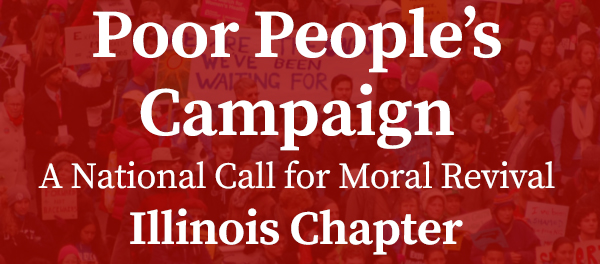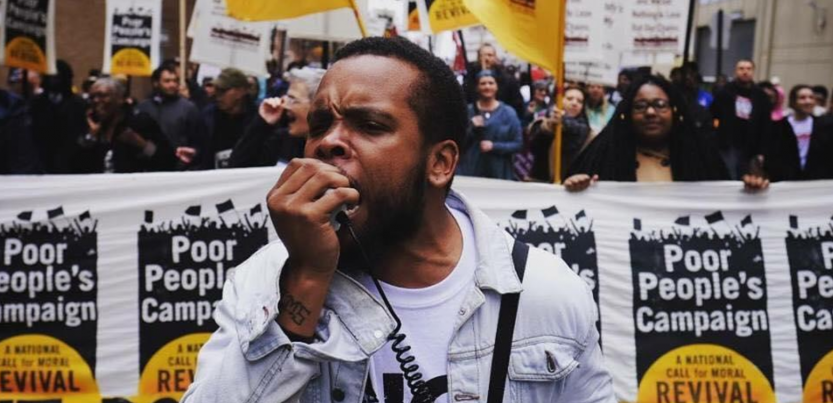Poor People’s Campaign to Challenge Systemic Racism as Protests at Illinois State Capitol Intensify
Nonviolent Direct Action Planned in Springfield, Part of Wave of Protests to Hit 35 States, Washington, D.C.
—
Poor People, Clergy, Advocates to Demand Immediate Restoration of the Voting Rights Act, End to Racist Gerrymandering, Reversal of State Laws that Prevent Municipalities from Raising Wages

SPRINGFIELD—A week after the historic re-ignition of the Poor People’s Campaign, poor people, clergy and advocates will intensify a six-week season of nonviolent direct action by marching on the Illinois statehouse to demand elected officials take immediate steps to confront systemic racism.
The action in Springfield is one of three dozen nationwide, including a major protest planned at the U.S. Capitol in Washington, D.C. that will feature Poor People’s Campaign: A National Call for Moral Revival co-chairs the Revs. William Barber and Liz Theoharis. It marks the second consecutive Monday protesters will march on the Illinois Capitol.
Last week, protesters took arrests to drive home the point that legislators must take a moral approach to address the problems that plague our state and nation.
Monday’s protest in the Capitol rotunda and at the governor’s office will highlight the connection between systemic racism, poverty and voter suppression. Participants in Monday’s nonviolent direct action are expected to carry signs that read “Voter Suppression = The True Hacking of our Democracy” and “Systemic Racism is Violence.” They’ll call for the immediate restoration of the Voting Rights Act, an end to racist gerrymandering and reversal of state laws that prevent municipalities from raising wages.
Days after President Trump called undocumented immigrants, “animals” who “aren’t people,” participants in Monday’s protest will demand a clear and just immigration system that strengthens our democracy through the broad participation of everyone in this country—including a timely citizenship process that guarantees the right to vote.
WHO: Participants in the Illinois Poor People’s Campaign: A National Call for Moral Revival
WHAT: Protest at Springfield statehouse demanding immediate action to address systemic racism
WHERE: Illinois State Capitol building rotunda, 301 S. 2nd St., Springfield, IL
WHEN: Monday, May 21 at 2PM

BACKGROUND:
The Poor People’s Campaign: A National Call for Moral Revival is co-organized by Repairers of the Breach, a social justice organization founded by the Rev. Barber; the Kairos Center for Religions, Rights and Social Justice at Union Theological Seminary; and hundreds of local and national grassroots groups across the country.
Last week, campaign co-chairs the Revs. William J. Barber II and Liz Theoharis were among hundreds arrested nationwide in the most expansive wave of nonviolent civil disobedience in U.S. history, kicking off a six-week season of direct action demanding new programs to fight systemic poverty and racism, immediate attention to ecological devastation and measures to curb militarism and the war economy.
The protests mark an emphatic reignition of the Poor People’s Campaign, the 1968 movement started by Dr. Martin Luther King, Jr. and so many others to challenge racism, poverty and militarism. Over 40 days, poor and disenfranchised people, moral leaders and advocates will engage in nonviolent direct action, including by mobilizing voters, knocking on tens of thousands of doors, and holding teach-ins, among other activities, as a moral fusion movement comprised of people of all races and religions takes off.
For the past two years, leaders of the Poor People’s Campaign: A National Call for Moral Revival have carried out a listening tour in dozens of states across this nation, meeting with tens of thousands of people from El Paso, Texas to Marks, Mississippi to South Charleston, West Virginia. Led by the Revs. Barber and Theoharis, the campaign has gathered testimonies from hundreds of poor people and listened to their demands for a better society.
A Poor People’s Campaign Moral Agenda, announced last month, was drawn from this listening tour, while an audit of America conducted with allied organizations, including the Institute for Policy Studies and the Urban Institute, showed that, in many ways, we are worse off than we were in 1968.
The Moral Agenda, which will guide the 40 days of actions, calls for major changes to address systemic racism, poverty, ecological devastation, the war economy and our distorted moral narrative, including repeal of the 2017 federal tax law, implementation of federal and state living wage laws, universal single-payer health care, and clean water for all.
The Campaign, expected to be a multi-year effort, draws on the unfinished work of the 1968 Poor People’s Campaign, reigniting the effort led by civil rights organizations, labor union and tenant unions, farm workers, Native American elders and grassroots organizers to foster a moral revolution of values. Despite real political wins in 1968 and beyond, the original Poor People’s Campaign was tragically cut short, both by the Rev. Dr. Martin Luther King Jr.’s assassination and by the subversion of the coalition that sustained it. Still, the original vision and many of its followers did not go away.
###
RELATED:
Hospital Workers Join the Poor People’s Campaign
Poor People’s Campaign Kicks off in Illinois & Missouri
